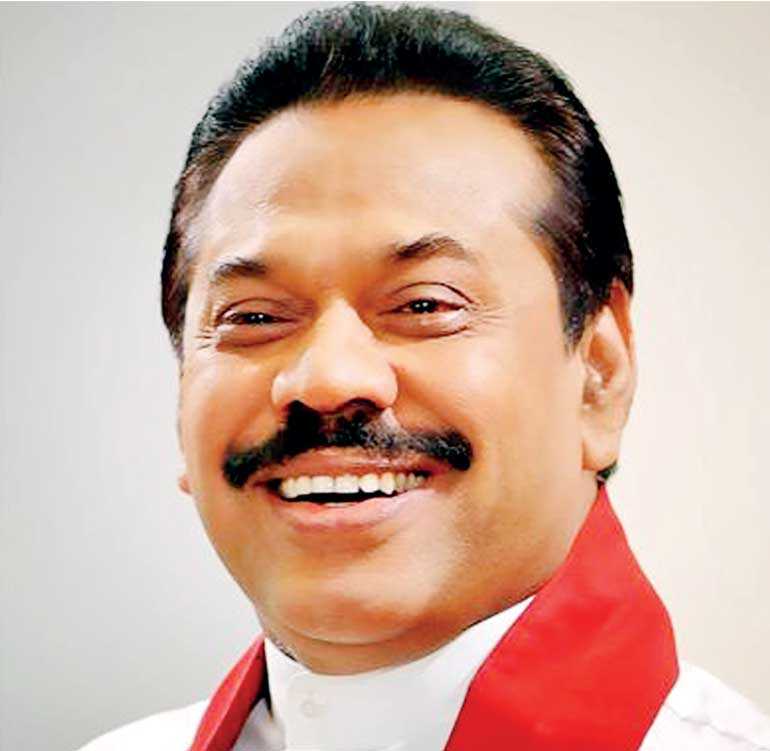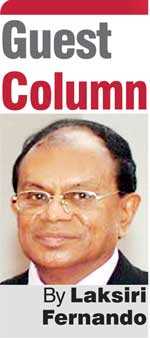Monday Feb 23, 2026
Monday Feb 23, 2026
Thursday, 4 October 2018 00:00 - - {{hitsCtrl.values.hits}}

Mahinda Rajapaksa may appear populist to the people, and ‘neo-populist’ to some left academics. However when he is in power, surrounded by family and other experts, he is typically an outright technocrat or oligarch
If the JVP had brought a simple private member bill to change the Sinhala and Tamil name for the President in the constitution, it could have done a better service to promote democracy in Sri Lanka than the present convoluted and not so democratic 20th Amendment.
When Sri Lanka became a republic in 1972, even the leftists like Colvin R. de Silva agreed to use this authoritarian sounding term for the nominal executive and the head of state as ‘Janadhipathi’ and ‘Janatipati’ respectively in Sinhala and Tamil. These leftists themselves were not that democratic.
Roots of adipathi thinking
Then J. R. Jayewardene in 1978, true to this ‘adipathi’ (authoritarian) mentality, changed the constitution in such a way that he claimed the only thing that he cannot do is to ‘convert a man to a woman and vice versa.’ One merit of JR however was that he graciously left after two terms and never inclined to amass wealth at the expense of the people.
Although the experts claim that JR took examples from the US and France in designing this presidential constitution, there were obvious local roots grounded not only in ancient authoritarian kingdoms and the hierarchical caste system, but also within the subservient colonial heritage. The ‘Sir’ mentality and its popular practice undoubtedly come from the colonial heritage. The term ‘Janadhipathi’ might be translated as ‘people’s ruler’ or even ‘people’s dictator.’ It is far beyond what is meant by a President of a democratic country, as the chief executive or the head of state. 
The modern democratic state or the polity is or should be a social association, like other associations in society, based on social contracts of the people. The main difference is that the membership or the citizenship is not completely voluntary (but by birth) and the laws are obligatory. Head of the State like head of any other association should be elected by the members and there is no inheritance or mystery attached to it. Today, people even have ample free choice in selecting citizenship or country of residence.
The words that we use have meaning in terms of our thinking, particularly in politics and political culture. This is not mere semantics. Why we use some words instead of others may represent and signify our thinking. The authoritarian and hierarchical mentality and practices in Sri Lankan society are pervasive in the administrative service, universities, religious organisations, family institution and even in NGOs. The private sector companies might not be that different.
In universities, Dean of a Faculty is called ‘Peeta-Adipathy’ and Head of a Department, ‘Ansa-Adipathy.’ Some people relish on these titles and often act as adipathies! Their responsibilities and functions are completely neglected. Other than schools, the universities are also the breeding grounds of ‘sir-madam’ mentality, coming particularly from the colonial heritage. One casualty of this authoritarian teaching/learning culture is the inhibitions on creativity and innovation on the one hand, and the distorted resistance in terms of student indiscipline/violence on the other.
Why a second hand president?
For a democratic republic, there is no question that a Head of State is necessary and not an Adipathy. That is where the change should occur, both in terms of culture and functions. It is better to elect that head of state by the people and not by parliamentarians. After election, they run away with people’s sovereignty for perks, bribes and in Sri Lanka’s case duty free vehicles! Why should the President be elected second hand? It is true that the parliamentarians are elected by the people. But even after that, people are the sovereign and not the parliamentarians. Therefore, the people should be able to elect the President, even if the presidency is nominal.
Our constitution assures that the people are sovereign. All power comes from the people. However, as Bertolt Brecht sarcastically asked, “Where does it go?” We need to look for answers. It is better to keep the sovereignty or the power with the people, and only give or transfer ‘responsibilities, duties and functions’ to the elected, whether the President, the Prime Minister, Ministers, Parliamentarians or any other.
Sri Lanka has a bad habit of going from one extreme to the other. Just because the executive presidential system was a failure and a disaster, and the powers were extreme, there is no need to scarp all functions from the presidency and create a different monster in the office of an executive Prime Minister or similar. What should be discussed is not about powers of the president, the prime minister or the cabinet or any other organ of the government, but their functions, duties and the responsibilities.
The political discourse on power is becoming obsolete, rotten and anti-democratic. An elected President could be a check and a balance on undemocratic economic or political measures of a technocratic PM or a Cabinet, that is already the case, and would become a major challenge in the feature after a possible change of government. It is important to note the statement by JVP leader, Anura Kumara Dissanayake, that ‘the 20th Amendment would benefit Mahinda Rajapaksa most, if he wants to become the next PM.’ Dissanayake must have said it in lighter vein, as he does many things these days, but it is ironically the truth.
Possible alternatives
Mahinda Rajapaksa may appear populist to the people, and ‘neo-populist’ to some left academics. However when he is in power, surrounded by family and other experts, he is typically an outright technocrat or oligarch, more than a person like Ranil Wickremesinghe. The main difference between them is about whom to align with most in international relations, and also in getting loans and projects (from the East or West; or from China, India or US). Other than that RW is an orthodox or incorrigible neoliberal, while MR is more of a pragmatist or rather an opportunist in economic matters.
‘Viyath Maga’ is also an indication of what kind of orientation an administration under MR would become in the future. This may appear good for the ‘economy’ or the local business classes, but not necessarily for the people or democracy in the country. All administrations so far have looked after the top 10% or at best top 20% of the population, but not about the bottom 20% or others.
It might be difficult to prevent Rajapaksas (SLPP) capturing power in Parliament. But it is possible to defeat a Rajapaksa at a presidential election, if right decisions and choices are made. Among other things, the above is a rationale for a ‘common, independent, credible and democratic’ presidential candidate to counter such a situation. All the adjectives mentioned are important.
(1) It should be a ‘common candidate’ to represent all the people and political forces that rallied to make the 2015 change a reality. The 2015 change was not a revolution, but a governmental change with considerable democratic openings.
(2) It should be an ‘independent’ candidate in two meanings. First, the candidate should not be UNP or SLFP as they have already betrayed the confidence and many of the aspirations of the 2015 change. Second, the candidate should be completely (politically) independent and fair (not apolitical) after the possible elections, even for a future Rajapaksa government, if they follow the rules and democracy. That is how a democracy should work.
(3) The candidate should be a ‘credible’ one, in the sense without corruption or malpractices and of course with a good CV. Most important for this credibility would be a firm backbone to stand against even to an autocratic Rajapaksa administration and anti-democratic measures.
(4) The candidate also should be a committed ‘democrat,’ not to abuse his/her office and convert the presidential responsibilities and duties to powers. As I have discussed previously, if the candidate is a ‘woman’ it is undoubtedly a bonus. I have not withdrawn that proposal.
Economic fallout
The crucial issues that Sri Lanka facing at present are not about the ‘powers’ of the President or the way the President should be elected. Those are largely settled by the 19th Amendment, although not for the greatest satisfaction. The crucial issues are economic.
It is difficult to imagine why a declared left party like the JVP is proposing such an amendment in a context where they should have focused more on people’s economic issues and bringing forward perhaps private member bills to ameliorate them. The country needs not just leftists or left parties, but committed socialists or socialist parties (or fronts) to fight on behalf of the poor, the rural masses and the middle layers of the population, while upholding democracy.
The recent deep down-turn of the rupee value might not directly be the result of the economic policies of the present government. Nevertheless, their policies have accelerated the fall and the repercussions. To unleash an orthodox neo-liberal agenda, in a situation where there was an impending trade war (US and China) and a clear collapse of neo-liberalism globally (UK and Europe), was simply suicidal and insane.
China is apparently different but affected. In a controlled or managed exchange rate system, a devaluation can bring results, if managed properly. However that is not the situation today. The major betrayals of the so-called Yahapalanaya have come in the sphere of economics.
There are other issues and matters that we can discuss, ideological and class analyses that we can and should make, but at the same time there should be realistic, tangible and futurist proposals. To have a broader picture in essence, the challenges that we are facing in Sri Lanka are not Sri Lankan alone.
There are two overlapping major contradictions in our present day society, and representative democracy. First is the contradiction between the economy and the polity. The polity is supposed to be democratic, the people as the sovereign. But the people are not sovereign at all in the economy. There are vast class and income differences. How does this contradiction maintained?
Second is the contradiction between the people and the politicians/parties. This is what we have discussed in this article mostly. Although the politicians or parties are supposed to represent the people, they do not represent them on crucial issues. They have become virtual parasites. While the second contradiction prevails, the first contradiction cannot be resolved.
Some promising signs
However there are some promising signs coming from the politically and ideologically unattached civil society organisations and personalities. To mention two most recent signs, the March 13 Movement (including PAFFREL, Sarvodaya, Sanasa, etc.) have strongly asked the Speaker to have a transparent procedure in appointing civil society members to the Constitutional Council. This is not like petitioning for or against personalities.
There is a need for a strong and truly independent Police Commission and the CC is important in appointing such in the near future. The police is apparently involved in politics and criminality, even under Yahapalanaya, not to speak of the alleged assassination coups.
Secondly, Nagananda Kodituwakku, a prominent public litigation activist, has accelerated his activities against corruption that particularly involves politicians and pressured the Finance Minister to stop importing of luxury vehicles duty free, and has asked the politicians to pay back, including Ranjan Ramanayake. The Finance Minister has partly acceded to the demand, perhaps to escape from the rupee devaluation.
These are small signs but promising ones. If we go along these lines and take necessary other stapes and measures, there won’t be much difficulty in finding a ‘common, independent, credible and a democratic’ candidate for the presidency, i.e. a people’s Sabhapathi and not Jana-Adipathi.